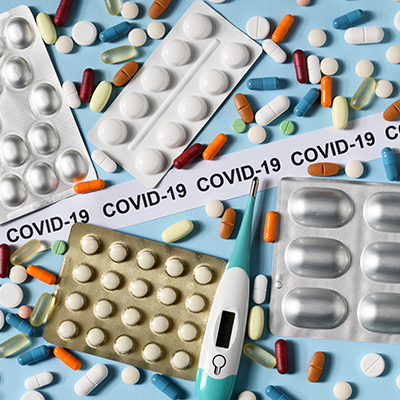August 10, 2020 -- Drug development can be an expensive and tedious process. Add in the urgency of the COVID-19 pandemic, and you have a recipe for frustration. Biosimulation -- using computers to simulate drug response in humans -- can help accelerate the process, which Certara hopes to achieve with a newly launched platform targeted at COVID-19 vaccine development.
Certara's COVID-19 quantitative systems pharmacology (QSP) platform is a new biosimulation platform for COVID-19 vaccines that utilizes its immunogenicity and immuno-oncology QSP. After initially partnering with the Bill and Melinda Gates Foundation's COVID Therapeutics Accelerator, the company has joined forces with seven pharmaceutical companies and regulators to help de-risk and speed COVID-19 vaccine development.
Tedious and massively expensive
Drug development can be a tedious and massively expensive endeavor, and efforts to develop a new drug can easily exceed the 10-year mark. Such a timetable would hardly suffice for the COVID-19 pandemic, however.
In an effort to accelerate the development of COVID-19 vaccines and therapies, scientists need to quickly answer critical questions and work on multiple developmental stages simultaneously. Moreover, stakeholders in large pharmaceutical and biotechnology companies, as well as nonprofits and governments, need to work together to beat COVID-19.
One way to speed things up is to use biosimulation -- computer-aided modeling of human biology, drug behavior, and disease. Biosimulation can help answer questions that are key to the drug development process, including:
- How does a drug work?
- How much of a drug dose do different people require and when?
- How can disease be prevented or cured?
Risks of vaccine development
Vaccine development consists of a repetitive stepwise process that evaluates efficacy and safety of a drug candidate in order to minimize side effects for patients and reduce the risk for manufacturers and developers. Early steps are crucial for determining the correct dosage of a drug, both overall and in specific populations.
The real risk of vaccine development is taken on by the pharmaceutical industry, which invests billions of dollars into manufacturing processes for drug candidates. If a drug fails in a phase III clinical trial, which happens often, manufacturing cannot simply be fit to a different candidate or even a different dose.
For COVID-19 these risks are increased by parallel development activities within accelerated timelines. In normal vaccine development, doses are carefully selected prior to manufacturing process development. With parallel development, dosage is not validated to the extent that it would normally be, and there is a chance that the dose at which the manufacturing process for a drug candidate is set up will fail in early development or not be approved.
"Biosimulation can help get it right the first time around," said Thomas Kerbusch, PhD, chief growth officer of Certara, in a briefing held conjunction with the launch. "Getting the optimal dose for safety and efficacy right the first time can inform the manufacturing process, including validation, testing, and stability processes, and help manufacturers invest in the right manufacturing for the right vaccine."
Reducing the need for trial and error
Biosimulation platforms can help companies make informed decisions about vaccine candidates across multiple patient populations. Trial and error, specifically for determining dosage, is too costly and timely. Technology platforms like biosimulation can help stakeholders answer what-if questions that may not be possible in real-world situations.
To figure out which candidates are the most successful within different populations, researchers can use model-based meta-analysis, enabled by artificial intelligence technology, to conduct head-to-head comparisons of safety and efficacy of different clinical trials. Here, endpoint units, clinical terms, and statistical calculations of various clinical protocols are standardized to determine the effects of background therapies and patient differences. While work in this field centers mostly on therapies, Certara has noted that it is actively working on collecting more vaccine information for its COVID-19 clinical outcomes database.
Furthermore, virtual patients can be used to mimic vaccine responses without the need for actual patients or clinical trials. Virtual patients are in silico clones of an actual person on a computer. Patients can vary based on demographics, genetics, medications, comorbidities, ethnicity, and immune baselines. The computer program will run virtual trials with a range of different doses and produces results in only a few hours.
COVID-19 QSP is a complex model that contains thousands of equations that can be implemented at all stages of vaccine development. Virtual simulations are currently being used to determine optimal dosing for elderly and young patients, as well as pregnant women, and for various ethnicities. The COVID-19 QSP builds upon the company's immunogenicity QSP simulator, which integrates bioinformatics and in-vitro assay inputs.
The model works by feeding properties of the SARS-CoV-2 spike protein into the system, where machine learning can infer from the structure how the human immune system is going to respond. As opposed to big data analysis, which trolls for findings in the larger context of published information, biosimulation is fed selective information to deliver structured responses.
Biosimulation can ensure that "every individual patient gets the best dosage of a vaccine," said Piet van der Graaf, PhD, senior vice president of quantitative systems pharmacology at Certara.
Do you have a unique perspective on your research related to vaccine development? Contact the editor today to learn more.
Copyright © 2020 scienceboard.net








